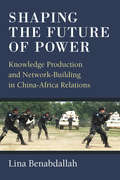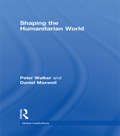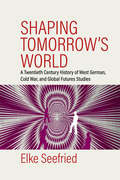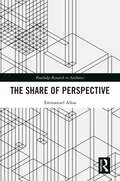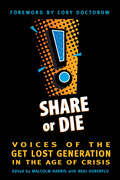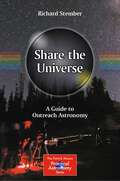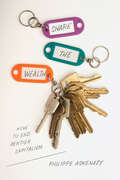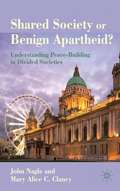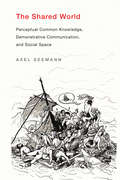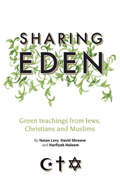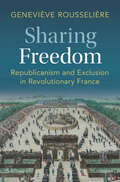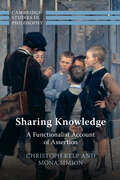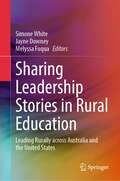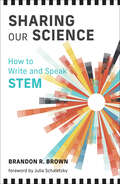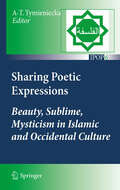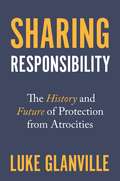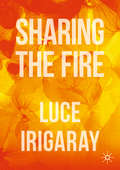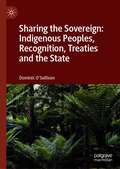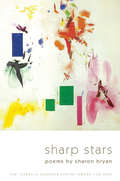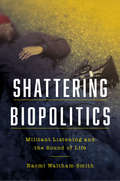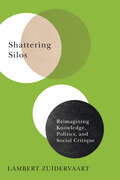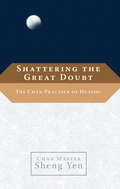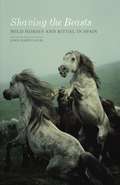- Table View
- List View
Shaping the Future of Power: Knowledge Production and Network-Building in China-Africa Relations
by Lina BenabdallahChina’s rise to power is one of the biggest questions in International Relations theory (IRT) and foreign policy circles. Although power has been a core concept of IRT for a long time, the faces and mechanisms of power as it relates to Chinese foreign policymaking has changed the contours of that debate. The rise of China and other powers across the global political arena sparks a new visibility for different kinds of encounters between states, particularly between China and other Global South states. These encounters are more visible to IR scholars because of the increasing influence that rising powers have in the international system. This book shows that foreign policy encounters between rising powers and Global South states do not necessarily exhibit the same logics, behaviors, or investment strategies of Euro-American hegemons. Instead, they have distinctive features that require new theoretical frameworks for analysis. Shaping the Future of Power probes the types of power mechanisms that build, diffuse, and project China’s power in Africa. One must take into account the processes of knowledge production, social capital formation, and skills transfers that Chinese foreign policy directs toward African states to fully understand China’s power-building mechanisms. The relational power framework requires these elements to capture both the material aspects and ideational people-centered aspects to power. By examining China’s investments in human resource development programs for Africa, the book reveals a vital, yet undertheorized, aspect of China’s foreign policy making.
Shaping the Humanitarian World (Global Institutions)
by Daniel G Maxwell Peter WalkerProviding a critical introduction to the notion of humanitarianism in global politics, tracing the concept from its origins to the twenty-first century, this book examines how the so called international community works in response to humanitarian crises and the systems that bind and divide them. By tracing the history on international humanitarian action from its early roots through the birth of the Red Cross to the beginning of the UN, Peter Walker and Daniel G. Maxwell examine the challenges humanitarian agencies face, from working alongside armies and terrorists to witnessing genocide. They argue that humanitarianism has a vital future, but only if those practicing it choose to make it so. Topics covered include: the rise in humanitarian action as a political tool the growing call for accountability of agencies the switch of NGOs from bit players to major trans-national actors the conflict between political action and humanitarian action when it comes to addressing causes as well as symptoms of crisis. This book is essential reading for anyone with an interest in international human rights law, disaster management and international relations.
Shaping Tomorrow's World: A Twentieth-Century History of West German, Cold War, and Global Futures Studies
by Elke SeefriedShaping Tomorrow’s World tells the crucial story of how futures studies developed in West Germany, Europe, the US and within global futures networks from the 1940s to the 1980s. It charts the emergence of different approaches and thought styles within the field ranging from Cold War defense intellectuals such as Herman Kahn to critical peace activists like Robert Jungk. Engaging with the challenges of the looming nuclear war, the changing phases of the Cold War, ‘1968’, and the growing importance of both the Global South and environmentalism, this book argues that futures scholars actively contributed to these processes of change. This multiple award-winning study combines national and transnational perspectives to present a unique history of envisioning, forecasting, and shaping the future.
The Share of Perspective (Routledge Research in Aesthetics)
by Emmanuel AlloaThis book is a defense of perspectivism in the age of post-truth. At the crossroads of science, art, and philosophy, it unearths a tradition that we must rediscover: the point of view is not only what divides, it is also what is shared.Today, perspective is associated with individualism and personal viewpoints. But in an age of post-truth, the only robust answer to relativism lies in fact in a reappraisal of perspectivism. In discussion with contemporary new realisms of various sorts, this book makes a case why perspectivism alone can avoid us falling back into epistemological naivetés. A journey into the history of optics, art, philosophy, and social psychology, this book unearths the forgotten tradition of perspectiva communis, which makes perspective the vector of a common horizon. This book argues that vision is never immediate. Rather, to see through is the key to understanding the perspectival operation. We never see by ourselves—all seeing must pass through something other than itself, through the mediation and the detour of an apparatus or the witness of a third party. Besides the theoretical framework for this new approach to perspective, this book presents a series of case studies ranging from innovative interpretations of classical authors and key moments in the history of art—from ancient painting, trompe l’oeil, and Brunelleschi’s experiment in Renaissance Florence—to the issue of perspective in the work of contemporary artists such as Robert Smithson.The Share of Perspective will be of interest to scholars and advanced students working in aesthetics, phenomenology, art history, and the history of sciences.
Share or Die: Voices of the Get Lost Generation in the Age of Crisis
by Malcolm Harris and Neal GorenfloEssays from Generation Y, or Millennials, around the globe on what it&’s like for them to try to make it in the real world after graduation. America stands at a precipice; limitless consumption, reckless economics, and disregard for the environment have put the country on a collision course with disaster. It&’s up to a younger generation to rebuild according to new forms of organization, and Share or Die is a collection of messages from the front lines. From urban Detroit to central Amsterdam, and from worker co-operatives to nomadic communities, an astonishing variety of recent graduates and twenty-something experimenters are finding (and sharing) their own answers to negotiating the new economic order. Their visions of a shared future include:· Collaborative consumption networks instead of private ownership · Replacing the corporate ladder with a &“lattice lifestyle&” · Do-it-yourself higher education As a call-to-action, &“share or die&” doesn&’t only refer to resource depletion, disappearing jobs, or stagnating wages. It refers to social death too, and to finding the commonsense ideas and practices needed to not only merely survive, but also to build a place where it&’s worth living. A series of forays into uncharted territory, this graphically rich collection of essays, narratives, and how-tos is an intimate guide to the new economic order and a must-read for anyone attempting to understand what it means to live as part of Generation Y.&“If you know someone who dreams of something bigger than being part of the rat race, please give them this book.&” —Raj Patel, author of The Value of Nothing
Share the Universe: A Guide to Outreach Astronomy (The Patrick Moore Practical Astronomy Series)
by Richard StemberAs every astronomer knows, astronomy is one of the most approachable and inspiring of the natural sciences. It appeals to both children and adults while drawing in curious minds with its immense distances and unimaginably powerful natural phenomena. In this book, you will find out how to be a part of the journey in sharing scientific knowledge and inspiring minds of all ages. By using the affordable tools and techniques provided in this book – you will learn about how astronomers can easily engage people with views of our solar system’s planets, moons, and even more distant objects like nebulas, stellar nurseries, and remnants of exploded stars. Perhaps most importantly, the natural appeal of this science is helpful when explaining to non-scientists how science “works." What is science and scientific methodology? How is it used to give mankind knowledge and solutions to problems that we face in many scientific fields including medicine? How does it differ from other sources of information? This book, sprinkled with the author’s 24 plus years of personal experience in public outreach, offers practical techniques to engage, educate, and inspire all who are interested in the field of astronomy.
Share the Wealth: How to End Rentier Capitalism
by Philippe AskenazyA new perspective on the neoliberal world through the prism of rents and rentiersHow can we reduce inequalities? How can we make work get better recognition and better pay?Philippe Askenazy in this new book shows that the current share of wealth is far from natural; it results from rising rents and their capture by the actors best endowed in the economic game. In this race for rents, the world of work is the big loser: while many workers feed capital rents by increased productivity and worsened working conditions, they are stigmatized as unproductive and their earnings stagnate. By proposing a new description of the capital-work relationship, calling for a remobilization of the world of work, and particularly poorly paid employees, Askenazy shows that there is a more radical alternative to neoliberalism beyond simply redistribution.
Shared Society or Benign Apartheid?
by John Nagle Mary-Alice C. ClancyThis book analyses the role power sharing, social movements, economic regeneration, urban space, memorialisation and symbols play in transforming divided societies into shared peaceful ones. It explains why some projects are counterproductive while others assist peace-building.
The Shared World: Perceptual Common Knowledge, Demonstrative Communication, and Social Space (The\mit Press Ser.)
by Axel SeemannA novel treatment of the capacity for shared attention, joint action, and perceptual common knowledge.In The Shared World, Axel Seemann offers a new treatment of the capacity to perceive, act on, and know about the world together with others. Seemann argues that creatures capable of joint attention stand in a unique perceptual and epistemic relation to their surroundings; they operate in an environment that they, through their communication with their fellow perceivers, help constitute. Seemann shows that this relation can be marshaled to address a range of questions about the social aspect of the mind and its perceptual and cognitive capacities.Seemann begins with a conceptual question about a complex kind of sociocognitive phenomenon—perceptual common knowledge—and develops an empirically informed account of the spatial structure of the environment in and about which such knowledge is possible. In the course of his argument, he addresses such topics as demonstrative reference in communication, common knowledge about jointly perceived objects, and spatial awareness in joint perception and action.
Sharing Eden
by Natan Levy David Shreeve Harfiyah Haleem"Finding common ground between Christianity, Islam, and Judaism is a critical priority for the whole world-and nowhere is that common ground more evident or inspiring than on environmental issues."- Jonathon Porritt, co-founder, Forum for the Future"[A] very encouraging and helpful project, and I hope it inspires those in each of the three traditions to collaborate more in environmental thought."-Sustainability in Crisis, United KingdomThis introductory handbook combines beautiful and enlightening texts from each faith's religious teachings to address some of the most prominent environmental issues faced today, such as waste, climate change, and biodiversity. Each author brings a contemporary focus to the eternal challenge of caring for the environment and provides practical advice on how we can all do our share to protect it.Sharing Eden sets out to show how respect for the environment is at the heart of Judaism, Christianity, and Islam.Natan Levy is the environmental liaison for the Chief Rabbi's Office and the rabbinical expert for the London School of Jewish Studies' Responsibility Unit, both based in the Untied Kingdom.David Shreeve is the director of The Conservation Foundation, which he co-founded in 1982, and the environmental advisor to the Archbishops' Council of the Church of England.Harfiyah Haleem is a trustee of the Islamic Foundation for Ecology and Environmental Sciences (IFEES). She is also the editor of a collection of essays on Islam and the environment and co-editor of the Muslim Green Guide to Reducing Climate Change.
Sharing Freedom: Republicanism and Exclusion in Revolutionary France
by Geneviève RousselièreThe French have long self-identified as champions of universal emancipation, yet the republicanism they adopted has often been faulted for being exclusionary – of women, foreigners, and religious and ethnic minorities. Can republicanism be an attractive alternative to liberalism, communism, and communitarianism, or is it fundamentally flawed? Sharing Freedom traces the development of republicanism from an older elitist theory of freedom into an inclusive theory of emancipation during the French Revolution. It uncovers the theoretical innovations of Rousseau and of revolutionaries such as Sieyès, Robespierre, Condorcet, and Grouchy. We learn how they struggled to adapt republicanism to the new circumstances of a large and diverse France, full of poor and dependent individuals with little education or experience of freedom. Analysing the argumentative logic that led republicans to justify the exclusion of many, this book renews the republican tradition and connects it with the enduring issues of colonialism, immigration, slavery, poverty and gender.
Sharing Knowledge: A Functionalist Account of Assertion (Cambridge Studies in Philosophy)
by Christoph Kelp Mona SimionAssertion is the central vehicle for the sharing of knowledge. Whether knowledge is shared successfully often depends on the quality of assertions: good assertions lead to successful knowledge sharing, while bad ones don't. In Sharing Knowledge, Christoph Kelp and Mona Simion investigate the relation between knowledge sharing and assertion, and develop an account of what it is to assert well. More specifically, they argue that the function of assertion is to share knowledge with others. It is this function that supports a central norm of assertion according to which a good assertion is one that has the disposition to generate knowledge in others. The book uses this functionalist approach to motivate further norms of assertion on both the speaker and the hearer side and investigates ramifications of this view for other questions about assertion.
Sharing Leadership Stories in Rural Education: Leading Rurally across Australia and the United States
by Simone White Jayne Downey Melyssa FuquaThis book brings together the two fields of ‘educational leadership’ and ‘rurality’ and builds on the growing field of inquiry into the significance of ‘adding the rural’ to all aspects of education. It explores the vibrancy and variety of opportunities and challenges that are met by rural education leaders and researchers from two particular countries, Australia and the United States. It illuminates and explores the concept of rural leadership and take an educational stance, shedding light into what it means to lead rurally for educational policy, research, schools, communities and for the next generation of rural leaders themselves. It presents stories from the field with insights into capabilities, approaches, models and strategies for improving practice and outcomes. In addition to adding to the international bodies of knowledge, this volume contributes to advancements in educational leadership theories, as well as expands understanding of requisite knowledge and skills as informed by the distinct circumstances and affordances of rural contexts. This book also explores the construct of service, and explores ways in which it has been infused in various rural education leadership contexts.
Sharing Our Science: How to Write and Speak STEM
by Brandon R. BrownA personal, practical, and inspirational guide to written and oral STEM communications for scientists and technical professionals.In Sharing Our Science, scientist-turned-writing teacher Brandon Brown offers an eminently useful guidebook for STEM practitioners looking to communicate their technical work to either a technical or a broader audience. Professionals are increasingly required to communicate their work through blogs, podcasts, and newsletters and to submit to traditional media. After seeing his colleagues struggle to find a writing guide that tackled the unique challenges of writing and speaking about scientific topics, Brown set out to write the definitive handbook to assist STEM students, scientists, engineers, and tech workers alike.In this practical and relevant book, Brown uses his experience as a proven science communicator to cover three levels of writing: fundamental craft considerations, such as narrative tension, structure, sentences, and audience; unique scientific considerations, such as conveying numbers and utilizing metaphors; and finally, social considerations, such as public speaking and writing inside and outside of silos. In place of a reference manual, Brown&’s engaging narrative guide clarifies the fundamental principles that impact all scientific communication tasks, from white papers and slide decks to Zoom meetings and emails. Sharing Our Science represents the culmination of a lifetime of writing, research, and teaching that will enrich scientists&’ careers and illuminate the ways in which science is done and conveyed to the world.
Sharing Poetic Expressions
by Anna-Teresa TymienieckaA world ever more extensively interlinked is calling out for serving human interests broader and more compelling than those inspiring our technological welfare. The interface between cultures - at the moment especially between the Occident and Islam - presents challenges to mutual understandings and calls for restoring the resources of our human beings forgotten in the struggle of competition and rivalry at the vital spheres of existence. In the evolutionary progress of the living beings the strictly vital concerns, emotions, attributes become sublimed and elevated to the spiritual sphere at which human beings encounter each other and share. Studies presented here bring forth sublimity, generosity, forgiveness, beauty, and are exalting the quest after ciphers and symbols which lead to our sharing the common deepest stream of fraternal reality.
Sharing Responsibility: The History and Future of Protection from Atrocities (Human Rights and Crimes against Humanity #43)
by Luke GlanvilleA look at the duty of nations to protect human rights beyond borders, why it has failed in practice, and what can be done about itThe idea that states share a responsibility to shield people everywhere from atrocities is presently under threat. Despite some early twenty-first century successes, including the 2005 United Nations endorsement of the Responsibility to Protect, the project has been placed into jeopardy due to catastrophes in such places as Syria, Myanmar, and Yemen; resurgent nationalism; and growing global antagonism. In Sharing Responsibility, Luke Glanville seeks to diagnose the current crisis in international protection by exploring its long and troubled history. With attention to ethics, law, and politics, he measures what possibilities remain for protecting people wherever they reside from atrocities, despite formidable challenges in the international arena.With a focus on Western natural law and the European society of states, Glanville shows that the history of the shared responsibility to protect is marked by courageous efforts, as well as troubling ties to Western imperialism, evasion, and abuse. The project of safeguarding vulnerable populations can undoubtedly devolve into blame shifting and hypocrisy, but can also spark effective burden sharing among nations. Glanville considers how states should support this responsibility, whether it can be coherently codified in law, the extent to which states have embraced their responsibilities, and what might lead them to do so more reliably in the future.Sharing Responsibility wrestles with how countries should care for imperiled people and how the ideal of the responsibility to protect might inspire just behavior in an imperfect and troubled world.
Sharing the Fire: Outline of a Dialectics of Sensitivity
by Luce IrigarayWhilst he broaches the theme of the difference between the sexes, Hegel does not go deep enough into the question of their mutual desire as a crucial stage in our becoming truly human. He ignores the dialectical process regarding sensitivity and sensuousness. And yet this is needed to make spiritual the relation between two human subjectivities differently determined by nature and to ensure the connection between body and spirit, nature and culture, private life and public life. This leads Hegel to fragment human subjectivity into yearnings for art, religion and philosophy thereby losing the unity attained through the cultivation of a longing for the absolute born of a desire for one another as different.Furthermore, our epoch of history is different from the Hegelian one and demands that we consider additional aspects of human subjectivity. This is essential if we are to overcome the nihilism inherent in our traditional metaphysics without falling into a worse nihilism due to a lack of rigorous thinking common today.The increasing power of technique and technologies as well as the task of building a world culture are two other challenges we face. Our sexuate belonging provides us with a universal living determination of our subjectivity – now a dual subjectivity - and also with a natural energy potential which allows us to use technical resources without becoming dependent on them.
Sharing the Sovereign: Indigenous Peoples, Recognition, Treaties and the State
by Dominic O'SullivanThis book explains how recognition theory contributes to non-colonial and enduring political relationships between Indigenous nations and the state. It refers to Indigenous Australian arguments for a Voice to Parliament and treaties to show what recognition may mean for practical politics and policy-making. It considers critiques of recognition theory by Canadian First Nations’ scholars who make strong arguments for its assimilationist effect, but shows that ultimately, recognition is a theory and practice of transformative potential, requiring fundamentally different ways of thinking about citizenship and sovereignty. This book draws extensively on New Zealand’s Treaty of Waitangi and measures to support Maori political participation, to show what treaties and a Voice to Parliament could mean in practical terms. It responds to liberal democratic objections to show how institutionalised means of indigenous participation may, in fact, make democracy work better.
Sharp Stars
by Sharon BryanSharon Bryan's fourth poetry collection blends such disparate subjects as biology, astronomy, sports, philosophy, and music to probe humankind's desire for spiritual, even physical, transcendence. From Charles Mingus to Charles Barkley, from Buddy Holly to Bishop Berkeley, no reference is squandered in Bryan's prodigious imagination.Sharon Bryan's awards include the Academy of American Poets Prize, the Discovery Prize from The Nation, and two NEA fellowships. She has published three poetry collections and edited Planet on the Table: Poets on the Reading Life and Where We Stand: Women Poets on Literary Tradition. She is a visiting professor of poetry at the University of Connecticut at Storrs.
Sharp Stars (American Poets Continuum #119.00)
by Sharon BryanSharon Bryan’s fourth poetry collection blends such disparate subjects as biology, astronomy, sports, philosophy, and music to probe humankind’s desire for spiritual, even physical, transcendence. From Charles Mingus to Charles Barkley, from Buddy Holly to Bishop Berkeley, no reference is squandered in Bryan’s prodigious imagination.Sharon Bryan’s awards include the Academy of American Poets Prize, the Discovery Prize from The Nation, and two NEA fellowships. She has published three poetry collections and edited Planet on the Table: Poets on the Reading Life and Where We Stand: Women Poets on Literary Tradition. She is a visiting professor of poetry at the University of Connecticut at Storrs.
Shattered: A Memoir
by Hanif KureishiFrom acclaimed author and playwright Hanif Kureishi comes an urgent and stunning memoir about rebuilding a new life in the wake of devastating physical loss.In late 2022, in Rome, Hanif Kureishi had a fall. When he came to, he realized he could no longer walk. He could do nothing without the help of others and required constant care in a hospital. So began a yearlong odyssey through the medical systems of Rome and Italy, with the hope of somehow being able to return home to his house in London.While confined to a series of hospital wards, he felt compelled to write, but being unable to type or hold a pen, he began to dictate to family members the words that formed in his head—thoughts on his medical condition, but also parenthood, immigration, sex, psychoanalysis, and, of course, writing. The result was an extraordinary series of dispatches from his hospital bed: a diary of a life in pieces, recorded with rare honesty, humor, and verve.Shattered takes these dispatches—edited, expanded, and meticulously interwoven with new writing—and charts both a shattering and a reassembling: a new life born of pain and loss but also animated by new feelings of gratitude, humility, and love.
Shattering Biopolitics: Militant Listening and the Sound of Life (Commonalities)
by Naomi Waltham-SmithA missed phone call. A misheard word. An indiscernible noise. All these can make the difference between life and death. Failures to listen are frequently at the root of the marginalization and exclusion of certain forms of life. Audibility decides livability. Shattering Biopolitics elaborates for the first time the intimate and complex relation between life and sound in recent European philosophy, as well as the political stakes of this entanglement.Nowhere is aurality more pivotal than in the dialogue between biopolitical theory and deconstruction about the power over and of life. Closer inspection of these debates reveals that the main points of contention coalesce around figures of sound and listening: inarticulate voices, meaningless sounds, resonant echoes, syncopated rhythms, animal cries, bells, and telephone rings.Shattering Biopolitics stages a series of “over-hearings” between Jacques Derrida and Giorgio Agamben who often mishear or completely miss hearing in trying to hear too much. Notions of power and life are further diffracted as Hélène Cixous, Catherine Malabou, and Jean-Luc Nancy join in this high-stakes game of telephone. This self-destructive character of aurality is akin to the chanciness and risk of death that makes life all the more alive for its incalculability.Punctuating the book are a series of excurses on sound-art projects that interrogate aurality’s subordination and resistance to biopower from racialized chokeholds and anti-migrant forensic voice analysis to politicized speech acts and activist practices of listening.Shattering Biopolitics advances the burgeoning field of sound studies with a new, theoretically sophisticated analysis of the political imbrications of its object of inquiry. Above all, it is sound’s capacity to shatter sovereignty, as if it were a glass made to vibrate at its natural frequency, that allows it to amplify and disseminate a power of life that refuses to be mastered.
Shattering Silos: Reimagining Knowledge, Politics, and Social Critique
by Lambert ZuidervaartQuestions first raised by Hannah Arendt in the 1960s take on new urgency in the post-truth era, as political leaders blithely reject facts in the public domain: Is truth politically impotent? Are politics inherently false? Is the search for truth still relevant?Shattering Silos, a companion volume to Religion, Truth, and Social Transformation and Art, Education, and Cultural Renewal, provides a path-breaking response. As in his two previous books, Lambert Zuidervaart challenges the boundaries philosophers set up between epistemology, ethics, and political philosophy. Knowledge, he argues, takes different forms in various social domains, and all are subject to political struggle. A critique of contemporary society must draw on many social domains of knowledge, including the arts and religion, and should recast politics as a striving for truth in the broadest sense. Proposing a new conception of truth – one that emphasizes the unity of knowledge and truth, as well as their diversity among different social domains – Zuidervaart asks what such holism and pluralism suggest about how we understand politics and society. This book proposes a new understanding of large-scale social change, challenging how most people think about knowledge and truth.Interweaving epistemology, social criticism, and political thought, Shattering Silos aims to help redirect an allegedly post-truth society.
Shattering the Great Doubt: The Chan Practice of Huatou
by Sheng YenHuatou is a skillful method for breaking through the prison of mental habits into the spacious mind of enlightenment. The huatou is a confounding question much like a Zen koan. Typical ones are "What is wu [nothingness]?" or "What was my original face before birth-and-death?" But a huatou is unlike a koan in that the aim is not to come up with an answer. The practice is simple: ask yourself your huatou relentlessly, in meditation as well as in every other activity. Don't give up on it; don't try to think your way to an answer. Resolve to live with the sensation of doubt that arises, and it will pervade your entire existence with a sense of profound wonder, ultimately leading to the shattering of the sense of an independent self. Master Sheng Yen brings the traditional practice to life in this practical guide based on talks he gave during a series of huatou retreats. He teaches the method in detail, giving advice for dealing with the typical pitfalls and problems that arise, and answering retreat participants' questions as they experience the practice themselves. He then offers commentary on four classic huatou texts, grounding his instructions in the teaching of the great Chan masters.
Shaving the Beasts: Wild Horses and Ritual in Spain
by John Hartigan Jr.A vivid first-person study of a notorious equine ritual—from the perspective of the wild horses who are its targets Wild horses still roam the mountains of Galicia, Spain. But each year, in a ritual dating to the 1500s called rapa das bestas, villagers herd these &“beasts&” together and shave their manes and tails. Shaving the Beasts is a firsthand account of how the horses experience this traumatic rite, producing a profound revelation about the durability of sociality in the face of violent domination. John Hartigan Jr. constructs an engrossing, day-by-day narrative chronicling the complex, nuanced social lives of wild horses and the impact of their traumatic ritual shearing every summer. His story generates intimate, individual portraits of these creatures while analyzing the social practices—like grazing and grooming—that are the building blocks of equine society. Shaving the Beasts culminates in a searing portrayal of the inspiring resilience these creatures display as they endure and recover from rapa das bestas. Turning away from &“thick&” description to &“thin,&” Hartigan moves toward a more observational form of study, focusing on behaviors over interpretations. This vivid approach provides new and important contributions to the study of animal behavior. Ultimately, he comes away with profound, penetrating insights into multispecies interactions and a strong alternative to humancentric ethnographic practices.
